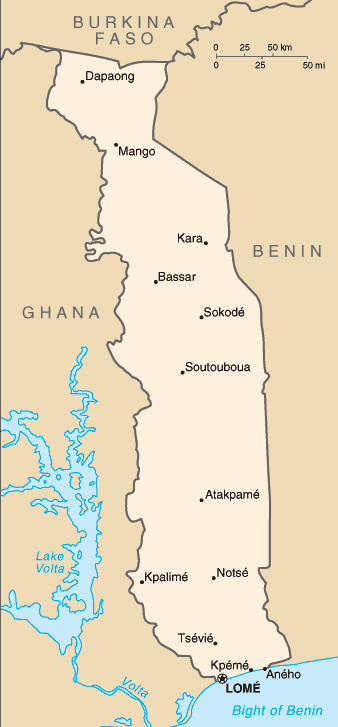Togo Map Courtesy CIA World Factbook
No one is quite sure what was happening in Togo before the Portuguese arrived in the late 15th century. Various tribes moved into the country from all sides - the Ewé from Nigeria and Benin and the Mina and Guin from Ghana. All of them settled on the coast. When the slave trade began in earnest in the 16th century, several of the tribes - especially the Mina - became agents for the European traders, travelling inland to buy slaves from the Kabyé and other northern tribes. Denmark staked a claim on Togo in the 18th century, but in 1884, Germany signed a deal with a local king, Mlapa, and 'Togoland' became a German colony. The Germans brought scientific cultivation to the country's main export crops (cacao, coffee and cotton) and developed its infrastructure to the highest level in Africa. Still in 1914, Togo was occupied by French and British forces. Togo was split between the British and the French by League of Nations mandates after World War I ended in 1918. During the colonial period, the Mina grew in political and economic influence by virtue of their coastal position and long association with Europeans. The Ewé, by contrast, were divided with the dissection of Togoland, and political groups on both sides began to agitate for reunification. Hopes for unity were dashed when British Togoland voted to be incorporated into Ghana, then on the brink of independence. After the expiration of the French-administered UN trusteeship on April 27, 1960, the French side declared its independence, with French Togoland becoming Togo. In 1963, Togo became the first country on the continent to experience a military coup following independence (Africa has averaged at least two a year since then, plus many more unsuccessful attempts). President Sylvanus Olympio, who took office as soon as Togo gained independence in 1960, was overthrown by 626 Togolese veterans of the French army. When Olympio refused to allow the veterans, many of whom had fought in Indochina and Algeria, to join Togo's army, they deposed him in a military coup on January 13, 1963. He was killed the next day, shot by Sgt. Etienne Eyadema. Olympio's brother-in-law, Nicolas Grunitzky, returned from exile and was put in charge, but he too was deposed in January 1967 by then Lt Colonel (later General) Étienne Eyadéma who became president. Since then, despite the façade of multiparty rule instituted in the early 1990s, the government continues to be dominated by the military, which has maintained its power continuously since 1967 and is loyal to Eyadéma and his family. Eyadéma set out to unify the country, insisting on one trade union confederation and one political party. After nearly losing his life in a plane crash that he (at least publicly) chalked up to an assassination attempt, Eyadéma nationalised the country's phosphate mines and ordered all Togolese to take an African name. He renamed himself Gnassingbé Eyadéma. It was, however, only a perfunctory strike against colonialism: Togo remained heavily dependent on the West. From the late 1960s to 1980, Togo experienced a booming economy, built largely on its phosphate reserves, and Eyadéma tried to mould the country into a traveller's and investor's paradise. His plans proved overly ambitious, and when the recession of the early 1980s hit and phosphate prices plummeted, Togo's economy fell into ruin. The government was plagued by numerous coup attempts. Eyadéma himself fired many of the shots that killed 13 attackers in a 1986 coup. In the early 1990s, the international community began putting pressure on Eyadéma to democratise, a notion he resisted with a few waves of his trademark iron fist. Pro-democracy activists - mainly southern Mina and Ewé - were met with armed troops, killing scores of protesters in several clashes. The people of France and Togo were furious, and under their backlash Eyadéma gave in. He was summarily stripped of all powers and made president in name only. An interim prime minister was elected to take over command, but not four months later his residence was shelled with heavy artillery by Eyadéma's army. Their hardball tactics continued into 1993. On February 5, 2005, Eyadéma died of a heart attack. Shortly afterwards, his son Faure Gnassingbé was named by Togo's military as the country's leader, raising numerous eyebrows. The constitution of Togo declared that in the case of the president's death, the speaker of Parliament takes his place, and has 60 days to call new elections. However, on February 6th, Parliament retroactively changed the Constitution, declaring that Faure would hold office for the rest of his father's term, with elections deferred until 2008. The African Union described the takeover as a military coup d'état. International pressure came also from the United Nations. Within Togo, opposition to the takeover culminated in riots in which four people died. In response, Gnassingbé agreed to hold elections in April 2005. On February 25, Gnassingbé resigned as president, soon after accepting nomination to run for the office in April. Parliament designated Deputy Speaker Bonfoh Abbass as interim president until the inauguration of the election winner. On May 3, 2005, Gnassingbé was sworn in as the new president garnering 60% of the vote according to official results.
|
|||||||||||||||||
|
 The Togolese Republic is a country in West Africa, bordering Ghana in the west, Benin in the east and Burkina Faso in the north. In the south, it has a short Gulf of Guinea coast, on which the capital Lomé is located.
The Togolese Republic is a country in West Africa, bordering Ghana in the west, Benin in the east and Burkina Faso in the north. In the south, it has a short Gulf of Guinea coast, on which the capital Lomé is located.